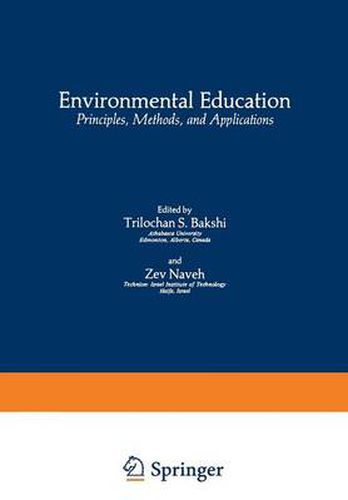Readings Newsletter
Become a Readings Member to make your shopping experience even easier.
Sign in or sign up for free!
You’re not far away from qualifying for FREE standard shipping within Australia
You’ve qualified for FREE standard shipping within Australia
The cart is loading…






This title is printed to order. This book may have been self-published. If so, we cannot guarantee the quality of the content. In the main most books will have gone through the editing process however some may not. We therefore suggest that you be aware of this before ordering this book. If in doubt check either the author or publisher’s details as we are unable to accept any returns unless they are faulty. Please contact us if you have any questions.
The environmental movement of the 1960s made educationists in some parts of the world aware of the significance and importance of ecology in curricula at all levels of education, from kindergarten to post-secondary. A great deal of progress was made in the early 1970s in incorporating environmental awareness programs into educa tional systems go that what was once considered a fad was gradually becoming a part of formal education in a number of institutions, especially in Canada and the U.S.A. It was therefore appropriate that an international scientific body devote some time to the issue of ecology in education. Early in 1976, I suggested to the International Association for Ecology (Inteco1) that a symposium on Environmental Education be included in the program of the Second International Congress of Ecology scheduled to be held in Jerusalem in September 1978. In the first draft program of the Congress, the topic was included as a poster session. I considered this inadequate and appealed to the Congress Steering Committee to focus greater attention on environ mental education. The first draft program contained phrases like utilization of resources , conservation problems , environmental moni toring , and irreversible changes . These phrases more or less assumed that people in general understood ecological principles. Literature on environmental education seems to suggest that a wide gap separated most of the professional ecologists from a large portion of mankind primarily because we the ecologists have paid scant attention to the ecological education of world’s citizens.
$9.00 standard shipping within Australia
FREE standard shipping within Australia for orders over $100.00
Express & International shipping calculated at checkout
This title is printed to order. This book may have been self-published. If so, we cannot guarantee the quality of the content. In the main most books will have gone through the editing process however some may not. We therefore suggest that you be aware of this before ordering this book. If in doubt check either the author or publisher’s details as we are unable to accept any returns unless they are faulty. Please contact us if you have any questions.
The environmental movement of the 1960s made educationists in some parts of the world aware of the significance and importance of ecology in curricula at all levels of education, from kindergarten to post-secondary. A great deal of progress was made in the early 1970s in incorporating environmental awareness programs into educa tional systems go that what was once considered a fad was gradually becoming a part of formal education in a number of institutions, especially in Canada and the U.S.A. It was therefore appropriate that an international scientific body devote some time to the issue of ecology in education. Early in 1976, I suggested to the International Association for Ecology (Inteco1) that a symposium on Environmental Education be included in the program of the Second International Congress of Ecology scheduled to be held in Jerusalem in September 1978. In the first draft program of the Congress, the topic was included as a poster session. I considered this inadequate and appealed to the Congress Steering Committee to focus greater attention on environ mental education. The first draft program contained phrases like utilization of resources , conservation problems , environmental moni toring , and irreversible changes . These phrases more or less assumed that people in general understood ecological principles. Literature on environmental education seems to suggest that a wide gap separated most of the professional ecologists from a large portion of mankind primarily because we the ecologists have paid scant attention to the ecological education of world’s citizens.